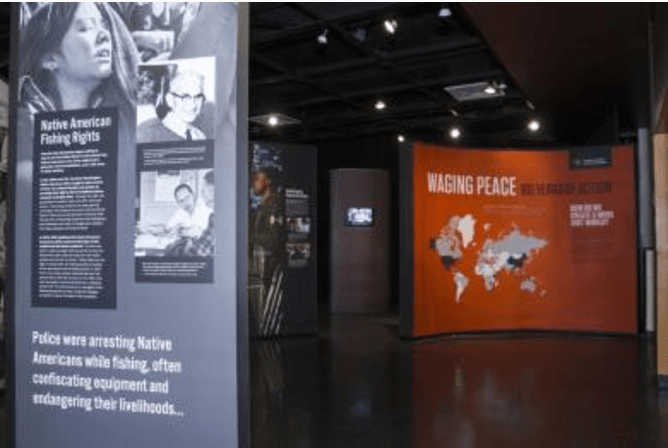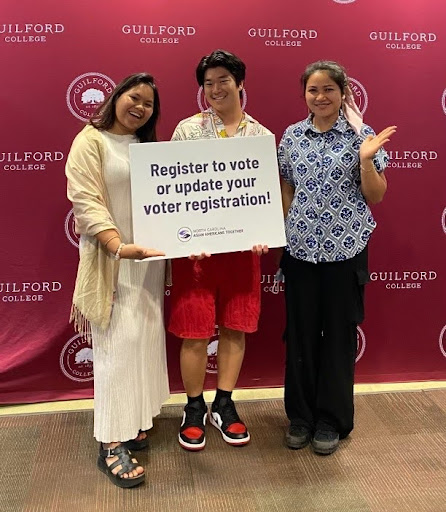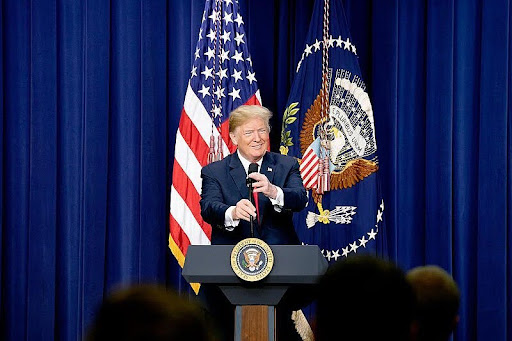Art exhibit showcases work of the AFSC
Since 1917, the American Friends Service Committee has been working to encourage peace through activism, awareness and community support.
Guilford College is currently displaying the interactive exhibit “Waging Peace: 100 Years of Action” in the Hege Library Art Gallery. The show celebrates the accomplishments of a hundred years of AFSC and seeks to educate viewers on social issues across the United States and the world.
“The stories are powerful and something that speaks to current events, especially in minority communities,” said Nara Seymour, a junior working the event.
The stories came in different forms through exhibits. One focused on the ways in which Greensboro children view peace. The children were sketched by the artist Robin Luo based on photos taken after they were asked for their personal definitions of peace.
“I want people to seek peace,” said Luo. “I think most kids know how much peace and love they need.”
Peace was a primary reason Terry Hammond, the director of the Art Gallery, chose to have the exhibit here. “It’s not a traditional exhibit (for us), but I think with the current climate (and the interactive nature and subject, it) will draw students in,” Hammond said.
Guilford students, faculty and staff had the chance to interact with the exhibit on Saturday, Sept. 9 at the public opening of the exhibit and celebratory gala for AFSC. The program aimed to give people information about what AFSC has done and will do in the future.
Many Quaker students have worked with AFSC as conscientious objectors as an alternative to the draft, according to Max Carter, Guilford’s former Friends Center director.Carter reflected on the influence of AFSC on Guilford.
“AFSC provided not only service for students who did not want to go into the war for conscientious reasons, (but) it also helped to recruit faculty to Guilford College,” Carter said.
Since the founding of AFSC in Philadelphia, Guilford students have been working alongside the organization. The Greensboro branch of AFSC still works closely with Guilford, particularly through internships and volunteer events.
Outside of Guilford, AFSC’s main Greensboro program is the North Carolina Immigrant Rights Program.
“We’re really hoping to focus on providing undocumented folks in the community to have a vehicle to organize and be the change they want to see in their own lives,” said Lori Khamala, the Greensboro AFSC director.
The AFSC is also active in other social issues, and has exerted influence on the lives of many people connected with the organization.
Gebury Mowry, a German woman who was a child during World War II, was thankful to the aid provided by AFSC for both her family and her country.
“I ate food for months provided by AFSC,” Mowry said. The organization helped to rebuild Germany and provided people with workshops on democracy as well as necessary supplies.
The AFSC has had an impact domestically as well. Former congresswoman Eva Clayton spoke about how working a summer at AFSC helped her to develop skills for working in public service.
“AFSC enhanced my ability to listen…” Clayton said. “(They taught me that) the life we live is to serve others as well as ourselves.”
As the program concluded, supporters of AFSC held up their champagne (or juice), and toasted to a hundred more years of resistance, service and peace.
The exhibit will be open until Nov. 5.









